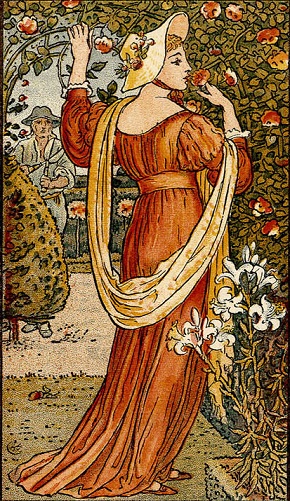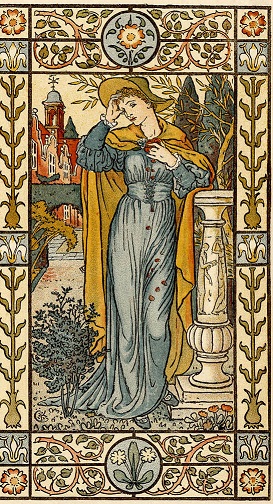[ Roud 3 ; G/D 6:1180 ; Ballad Index K167 , R090 , DTthymep , FSWB163 ; VWML CJS2/9/1 , CJS2/9/3359 , RoudFS/S160616 ; Bodleian Roud 3 ; trad.]
The Seeds of Love or “I Sowed the Seeds of Love” is a traditional ballad collected in 1903 by Cecil Sharp as sung by Mr. Jim Squires of Holford, Somerset, England. Incidentally, the text has nothing to do with the “Sowing the seeds of love” of The Tears for Fears.
A Warning Song in the garden
The Seeds of Love shares topic and verses with another warning song, The Sprig of Thyme.
FEMALE POINT OF VIEW
The seeds of love have blossomed in the red-hot rose of passion; the woman did a wrong choose between her suitors and letting herself be guided only by the external appearances. Unfortunately, the false lover gets tired soon and she worries beside a weeping willow, taking a vow of humility!
MALE POINT OF VIEW
Sung by a man the song (especially in the reduced version) takes on the sore voice of an abandoned lover.
(I, II, III, IV, V, VI-A)
(I, III, IV, V e VI-A, I)
Words traditional; Music by Loreena McKennitt
The Seeds of Love o “I sowed the Seeds of Love”, è una ballata tradizionale raccolta nel 1903 da Cecil Sharp cantata dal signor Jim Squires di Holford, Somerset, Inghilterra. Per inciso il testo non ha niente a che vedere con la “Sowing the seeds of love” dei Tears for Fears.
Una warning song nel giardino
The Seeds of Love condivide argomento e versi con un’altra warning song, The Sprig of Thyme.
Dalla parte della Donna
I semi dell’amore sono sbocciati nella rovente rosa rossa della passione, ma la donna ha sbagliato a scegliere tra i suoi corteggiatori, lasciandosi guidare dalle apparenze esteriori. Purtroppo il falso innamorato si stanca presto e lei si tormenta accanto ad un salice piangente, facendo voto di umiltà.
Dalla parte dell’uomo
Cantata da un uomo la canzone (in particolare nella versione ridotta) assume il tono dolente di un amante abbandonato


THE SEEDS OF LOVE
I(1)
I sowed the seeds of love
I sowed them in the spring
I gathered them up in the morning so soon
When the small birds so sweetly sing
When the small birds so sweetly sing.
[II
My garden was planted well
With flowers everywhere
But I had not the liberty to choose for myself
The flower I loved so dear.]
III
The gardener (2) was standing by
I asked him to choose for me
He chose for me the violet(3), the lily(4) and the pink(5),
But those I refused all three.
IV
The violet I did not like
Because it bloomed so soon
The lily and the pink I really over-think
So I thought I would wait till June.
V
In June there was a red rose bud(6)
That is the flower for me
I often times have plucked that red rose bud
Till I gained the willow tree(7).
VI-A
The willow tree will twist
The willow tree will twine
I wish I was lying in that young man’s arms (8)
That once held this heart of mine.
[VI-B
The gardener he stood by
And told me to take great care
For into the middle of the red rose bush
There grows a sharp thorn(9) there.]
VII
I told him I’d take no care
Till I had felt the smart
And I oftentimes plucked at the red rose bush
Till it pierced me to the heart.
VIII
A posy of hyssop(10) I’ll make
No other flower I’ll touch
That all the world may plainly see
I loved one flower too much.
FOOTNOTEs
(1) Jim Moray version
I sowed my seeds of love, It was all in the Spring And waited until the flowers did bloom.
(2) the gardener is a parental figure who directs the girl / boy towards an arranged marriage.
(3) Viola = modesty
(4) Lily = purity
(5) the pink indicates a large variety of pink flowers probably “pink rockrose“, ie the cistus, arrived in the English gardens around 1650. This flowers are more properly belonging to the Mediterranean vegetation called “May roses” both for the period of flowering and for the resemblance to wild roses.
(6) Red rose = romantic love, lust or “unbridled passion”
(7)Willow = fertility, but also sadness, sorrow = an unhappy, abandoned love .
(8) Jim Moray: in my true love’s arms
(9) the thorn in this context indicates the pains of love, the torments of the heart when the other no longer corresponds. It could however also be an unwanted pregnancy.
(10) Hyssop indicates humility as rue is an ingredient of herbal liqueurs for its digestive properties. The woman tells us that she is sorry for having loved and wants taking a vow of humility .
I SEMI DI AMORE
I
Ho seminato i semi dell’amore
e li ho seminati in primavera,
e ho raccolto i fiori al mattino presto,
quando gli uccellini cantano sì dolcemente.
quando gli uccellini cantano sì dolcemente.
II
Il mio giardino era ben piantato
con fiori ovunque,
ma non ero libera di sceglierli da me
i fiori da amare caramente.
III
Il giardiniere mi stava vicino
e gli chiesi di scegliere per me,
lui prese per me la violetta, il giglio e il cisto,
ma io li rifiutai tutti e tre.
IV
La viola non mi piaceva
perché fiorisce troppo presto
al giglio e al cisto nemmeno ci badai
così pensai di attendere fino a Giugno.
V
A Giugno c’era il bocciolo di una rosa rossa,
che è il mio fiore,
tante volte ho colto quel bocciolo di rosa rossa
finchè presi il salice.
VI-A
Il salice si piegherà
il salice si torcerà
come vorrei essere tra le braccia di quel giovanotto,
che un tempo aveva il mio cuore.
VI-B
Il giardiniere mi stava accanto
e diceva di fare molta attenzione
perché nel mezzo del cespuglio della rosa rossa
cresce una spina appuntita.
VII
Gli ho detto che non mi importava
perché mi credevo furba,
e spesso strappavo le rose rosse del cespuglio,
finchè mi trafissi il cuore.
VIII
Un mazzetto di issopo farò
e nessun altro fiore toccherò
che tutti possano vedere chiaramente
che ho amato troppo un fiore.
NOTE, Traduzione italiana di Cattia Salto
(1) Jim Moray
Io seminato i semi dell’amore ed era in primavera, e ho atteso che sbocciassero.
(2) il giardiniere è una figura genitoriale che indirizza la fanciulla/fanciullo verso un matrimonio combinato.
(3) Viola= modestia
(4) Giglio= purezza
(5) il temine è un po’ generico e sta a indicare una grande varietà di fiori rosa si ritiene indichi il “pink rockrose”, ossia il cistus, arrivato nei giardini inglesi intorno al 1650. Sono fiori più della macchia mediterranea dette “rose di maggio” sia per il periodo della fioritura che per la somiglianza con le rose selvatiche.
(6) Rosa rossa= amore romantico, lussuria o “passione sfrenata”
(7) Salice= fertilità, ma anche tristezza, dolore e in questo contesto l’amore infelice, abbandonato.
(8) Jim Moray “: tra le braccia della mia innamorata“.
(9) la spina indica le pene dell’amore, i tormenti del cuore quando l’altro non corrisponde più. Potrebbe però anche essere una gravidanza indesiderata.
(10) Issopo indica l’umiltà come la ruta è un ingrediente dei liquori d’erbe per le sue proprietà digestive. La donna ci dice che è pentita di aver amato e vuole fare voto di umiltà.
The Garden of England
La rielaborazione di Sam Lee per il suo cd “Old Wow” del 2020
Link
- http://www.musicanet.org/robokopp/english/isowed.htm
- http://www.recmusic.org/lieder/get_text.html?TextId=58154
- http://www.contemplator.com/england/seeds.html
- http://folksongcollector.com/isowed.html
